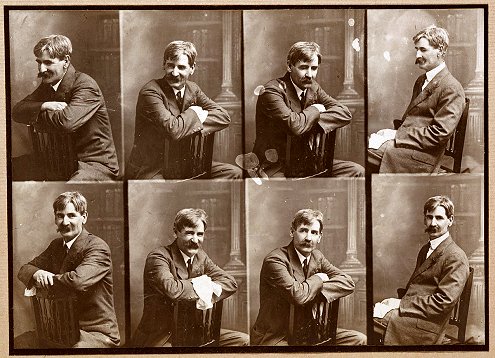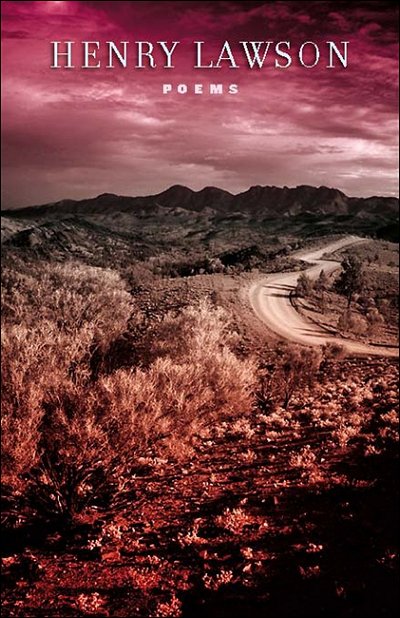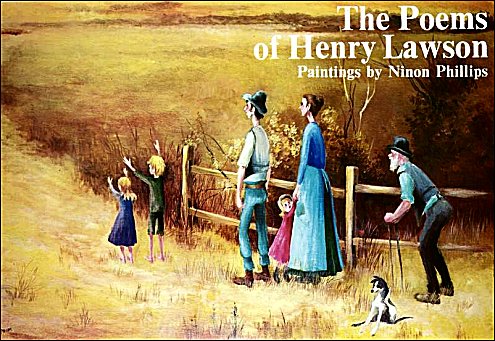Henri Lawson: Four Poems

H e n r y L a w s o n
(1867-1922)
Interlude
Callaghan’s Hotel
There’s the same old coaching stable that was used by Cobb and Co.,
And the yard the coaches stood in more than sixty years ago;
And the public-private parlour, where they serve the passing swell,
Was the shoeing forge and smithy up at Callaghan’s Hotel.
There’s the same old walls and woodwork that our fathers built to last,
And the same old doors and wainscot and the windows of the past;
And the same old nooks and corners where the Jim-Jams used to dwell;
But the Fantods dance no longer up at Callaghan’s Hotel.
There are memories of old days that were red instead of blue;
In the time of “Dick the Devil” and of other devils too;
But perhaps they went to Heaven and are angels, doing well–
They were always open-hearted up at Callaghan’s Hotel.
Then the new chum, broken-hearted, and with boots all broken too,
Got another pair of bluchers, and a quid to see him through;
And the old chum got a bottle, who was down and suffering Hell;–
And no tucker-bag went empty out of Callaghan’s Hotel.
And I sit and think in sorrow of the nights that I have seen,
When we fought with chairs and bottles for the orange and the green;
For the peace of poor old Ireland, till they rang the breakfast bell–
And the honour of Old England, up at Callaghan’s Hotel.

A Mixed Battle Song
Lo! the Boar’s tail is salted, and the Kangaroo’s exalted,
And his right eye is extinguished by a man-o’-warsman’s cap;
He is flying round the fences where the Southern Sea commences,
And he’s very much excited for a quiet sort of chap.
For his ships have had a scrap and they’ve marked it on the map
Where the H.M.A.S. Sydney dropped across a German trap.
So the Kangaroo’s a-chasing of his Blessed Self, and racing
From Cape York right round to Leeuwin, from the coast to Nevertire;
And of him need be no more said, save that to the tail aforesaid
Is the Blue Australian Ensign firmly fixed with copper wire.
(When he’s filled the map with white men there’ll be little to desire.)
I was sulky, I was moody (I’m inclined to being broody)
When the news appeared in Sydney, bringing joy and bringing tears,
(There’s an undertone of sorrow that you’ll understand to-morrow)
And I felt a something in me that had not been there for years.
Though I lean in the direction of most absolute Protection
(And of wheat on the selection)
And, considering Congestion and the hopeless unemployed,
I’d a notion (but I hid it) that, the way the Emden did it,
‘Twould be better for Australia if her “commerce” was destroyed.
You may say that war’s a curse, but the peace curse may be worse,
When it’s lasted till it’s rotten–rotten from the inmost core,
To the mouldy skin which we are, in the land we call the freer–
And I almost feel inclined to call for “Three Cheers for the War!”
For I think, when all is over, from Magellan’s Straits to Dover,
Things will be a great deal better than they ever were before.
But, since “Peace” and “Right” are squalling, I’ll content myself with calling
For three rousers–like the ringing cheers we used to give of yore–
For the Emden!
For the Sydney!
And their gallant crews and captains–both of whom we’ve met before!
And, for Kaiser William’s nevvy, we shall venture three cheers more!
Cheers that go to end a war.

Somewhere up in Queensland
He’s somewhere up in Queensland,
The old folks used to say;
He’s somewhere up in Queensland,
The people say to-day.
But Somewhere (up in Queensland)
That uncle used to know–
That filled our hearts with wonder,
Seems vanished long ago.
He’s gone to Queensland, droving,
The old folks used to say;
He’s gone to Queensland, droving,
The people say to-day.
But “gone to Queensland, droving,”
Might mean, in language plain,
He follows stock in buggies,
And gets supplies by train.
He’s knocking round in Queensland,
The old folks used to say;
He’s gone to Queensland, roving,
His sweetheart says to-day.
But “gone to Queensland, roving”
By mighty plain and scrub,
Might mean he drives a motor-car
For Missus Moneygrub.
He’s looking for new country,
The old folks used to say;
Our boy has gone exploring,
Fond parents say to-day.
“Exploring” out in Queensland
Might only mean to some
He’s salesman in “the drapery”
Of a bush emporium.
To somewhere up in Queensland
Went Tom and Ted and Jack;
From somewhere up in Queensland
The dusty cheques come back:
From somewhere up in Queensland
Brown drovers used to come,
And someone up in Queensland
Kept many a southern home.
Somewhere up in Queensland,
How many black sheep roam,
Who never write a letter,
And never think of home.
For someone up in Queensland
How many a mother spoke;
For someone up in Queensland
How many a girl’s heart broke.

Down in the River
I’ve done with joys an’ misery,
An’ why should I repine?
There’s no one knows the past but me
An’ that ol’ dog o’ mine.
We camp an’ walk an’ camp an’ walk,
An’ find it fairly good;
He can do anything but talk,
An’ he wouldn’t if he could.
We sits an’ thinks beside the fire,
With all the stars a-shine,
An’ no one knows our thoughts but me
An’ that there dog o’ mine.
We has our Johnny-cake an’ “scrag,”
An’ finds ’em fairly good;
He can do anything but talk,
An’ he wouldn’t if he could.
He gets a ‘possum now an’ then,
I cooks it on the fire;
He has his water, me my tea–
What more could we desire?
He gets a rabbit when he likes,
We finds it pretty good;
He can do anything but talk,
An’ he wouldn’t if he could.
I has me smoke, he has his rest,
When sunset’s gettin’ dim;
An’ if I do get drunk at times,
It’s all the same to him.
So long’s he’s got me swag to mind,
He thinks that times is good;
He can do anything but talk,
An’ he wouldn’t if he could.
He gets his tucker from the cook,
For cook is good to him,
An’ when I sobers up a bit,
He goes an’ has a swim.
He likes the rivers where I fish,
An’ all the world is good;
He can do anything but talk,
An’ he wouldn’t if he could.

Henri Lawson: Four Poems
fleursdumal.nl magazine
More in: Archive K-L, Lawson, Henry

